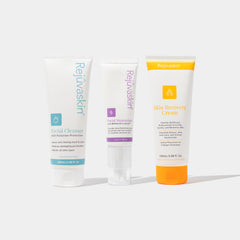Radiation Therapy is an essential step in the journey to becoming cancer-free for many patients. About 95% of those that receive radiotherapy will develop some sort of skin toxicity during their treatment schedule, commonly referred to as radiation dermatitis. Radiation dermatitis may be temporary, but it is not uncommon for them to cause a delay in important treatments. Think of it as a bad sunburn. The last thing that you want to do after receiving a sever sunburn is go back out and encounter the very thing that caused it, the sun. Many patients will pause their scheduled treatments and delay the good that comes from radiotherapy because of its effect on their skin. These missed treatments are the most dangerous side effect. So, how can you identify, slow, or prevent irritation caused by radiation therapy?
How do you identify radiation dermatitis?
The first step is to know how your skin may respond to treatment. As with any skin concern, the reaction caused by radiation depends on a number of factors. What type of skin do you have? How large is the area being treated? Do you have sensitive skin? Speak with your oncologist before your first session to better understand how your treatment may affect your skin. He or she may be able to provide a solution to help prevent or slow the side effects.
Radiation dermatitis is first identified by redness in the area receiving radiation. It may look similar to a severe sunburn. This can be followed by itching, soreness, burning, and dry skin. These issues usually manifest within the first 2-3 weeks of your first treatment. In extreme cases radiation may cause the skin to blister or peel. Typically, extreme skin irritation will come towards the end of your treatment schedule. It’s important to address your skin health early on before the effects of radiation cause too much damage to your skin.
How should you treat skin damaged by radiation therapy?
If your skin does become irritated, it’s important to treat it gently. Again, think of it as a bad sunburn. Avoid scratching, applying heat, and using harsh soaps. Be sure to be cautious when you are going out in the sunlight. Practice strict sun safety by using high-factor sunscreen and covering irritated skin with loose fitting clothing or a large hat. These steps help manage radiation dermatitis after it occurs, but what about dealing with it before it starts.
Some radiation creams can be used to help delay or prevent these symptoms during your treatment. Rejuvaskin Skin Recovery Cream is specifically formulated to help fortify, soothe, and revitalize skin before, during, and after treatment. We recommend using Revive about two weeks before your initial session to help prepare your skin for the upcoming radiation. It can then be used throughout your treatment to continue to manage any skin issues that arise.
Remember this, before you go in to your first session of radiation talk with your doctor or nurse about how it may affect your skin. Be prepared for your radiation treatment and don’t let your skin keep you from receiving all of your scheduled sessions.





















Leave a comment